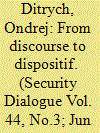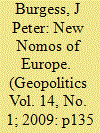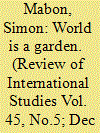| Srl | Item |
| 1 |
ID:
121823


|
|
|
|
|
| Publication |
2013.
|
| Summary/Abstract |
This article is a historical study of how states have articulated statements about terrorism since the 1930s; under what conditions these statements have been articulated; and what effects the discourses made up of these statements have had on global politics. This includes the constitutive role of the present discourse on what is posited as a terrorism dispositif. The inquiry is inspired by Foucault's historical method, and comprises the descriptive archaeological analytic focused on the order of the discourse (including basic discourses in which the terrorist subject is constituted) and the genealogical power analysis of external conditions of emergence and variation of discursive series, whose treatment benefits also from Carl Schmitt's concept of the nomos.
|
|
|
|
|
|
|
|
|
|
|
|
|
|
|
|
| 2 |
ID:
087530


|
|
|
|
|
| Publication |
2009.
|
| Summary/Abstract |
According to Carl Schmitt, in his late work The Nomos of the Earth, published in 1950, the long evolution in the relation between humans and the earth has been decisive for the nature of traditional legal order. The historical links to European international jurisprudence (ius publicum Europaeum) have decayed with the old world order that supported them. Territoriality, once the foundation of the nation-state has evolved, causing a parallel change in the nation-state paradigm of sovereignty and the fabric of international law which has its basis in that paradigm. If Schmitt is correct in his prognoses about the end of a global era and the rise of a new yet uncharted world order in the mid-1940s, then the architects of the nascent European Coal and Steel Community face the same conditions, and must carry out their work with the same cultural, social and juridical raw materials, against the backdrop of the same concrete historical experience. This article will attempt to continue the trajectory of Schmitt's historical analysis of the ius publicum Europeaum, suggesting how its central concepts and theses map onto the grand geopolitical and civilisational project of European construction from 1950 to 2004 and beyond. It will explore the applicability of the concept of nomos for the nature of EU evolution, and interpret general elements of the European legal system in terms of the concept of nomos.
|
|
|
|
|
|
|
|
|
|
|
|
|
|
|
|
| 3 |
ID:
168880


|
|
|
|
|
| Summary/Abstract |
Traditional approaches to questions about nomos in IR typically focus upon either its establishment and the formal structures that emerge through interaction within a clearly delineated spatial area, or an exploration of US hegemony in the post-2003 world. In this article I posit a different approach, building on the ideas of Giorgio Agamben, which grounds nomos as a spatialisation of the exception within conditions of neoliberal modernity. I suggest that within the global nomos are more localised nomoi. These localised nomoi are a consequence of the spatialisation of the exception and a fundamental tension between localisation and ordering. I argue that while sovereign power has been a source of contemporary scholarship, such explorations have paid scant attention to the regulatory power of normative values and their capacity to create order within space. Such norms allow for a greater awareness of how sovereign power can be mobilised in and of itself as a form of contestation. Locating such debates in the Middle East, I explore the concept of nomos to understand how struggle over the localisation and ordering of space helps us to better understand contemporary political life.
|
|
|
|
|
|
|
|
|
|
|
|
|
|
|
|